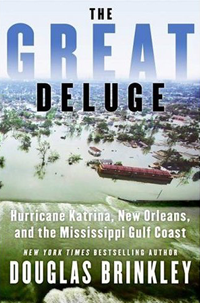
- The Great Deluge: Hurricane Katrina, New Orleans, and the Mississippi Gulf Coast
- HarperCollins (2005)
- Bookstore Finder
Less than a year after the destruction of New Orleans and the Gulf Coast, Douglas Brinkley produced a book about the disaster -- The Great Deluge: Hurricane Katrina, New Orleans, and the Mississippi Gulf Coast. It's 700 pages about a single week in the late summer of 2005.
To create a book of this size and scope would normally take years, but these are not normal times. Computer technology certainly played a part; it also helped that Brinkley is a prolific historian and a New Orleans resident. He drew on the electronic resources of countless news organizations, as well as personally interviewing scores of persons who escaped to Houston and other refuges.
We see increasing numbers of such instant books. Weeks before the Iraq War, Gwynne Dyer pounded out a book on why the war should not be fought. Others were pounding out books on why it should.
The Americans were still settling into Baghdad when more books started coming out that described the invasion. Then came books from ex-officials in the Bush administration, and a string of books on what went wrong in Iraq and Afghanistan.
In the 18th century, a major event or issue might trigger a spate of pamphlets. They could be written, typeset, printed and distributed in days, and their impact could be immense. Tom Paine published Common Sense in January 1776. By July 200,000 copies were circulating in North America, and the thirteen colonies were on their way to independence.
Adrift in information flotsam
Today's instant books don't have comparable impact. The American colonies had perhaps three million residents; many whites and virtually all blacks were illiterate. Nevertheless, Common Sense was read by, or read to, a million people -- half the adult white population.
In today's North America, no spin doctor or ad man could dream of such market penetration. We've got too many choices, too many media and arguably less literacy than colonial North America.
Nonetheless, writers and publishers seem ready to produce 700-page books with political intent -- monster pamphlets in hard covers. But most citizens pay attention to reality TV and Fox News, not to intense, documented study of current political issues. Presumably the authors of big instant books hope to reach the "opinion leaders" rather than the masses.
Simply by existing, a book like The Great Deluge will supply a topic for insatiable markets in talk radio, TV and print media. For every person who actually reads it, 50 or 100 may become vaguely aware that some book says New Orleans mayor Ray Nagin is an egocentric incompetent and George W. Bush lied when he said no one expected the levees to break.
What effect this will have on political affairs remains to be seen. Public awareness is notoriously dim in this age of online information. Despite all the instant books on the Iraq War, an Angus Reid poll in July revealed half of American adults believe Saddam Hussein had weapons of mass destruction when the U.S. invaded -- up 14 per cent since February 2005.
Faced with that kind of immunity to fact, why would anyone bother to write so much as a slogan on a wall, much less a 700-page book?
A nudge, not a shove
Well, those opinion leaders are still out there, capable of influencing future municipal and state elections across the Gulf Coast. Some of them will read The Great Deluge, and perhaps put pressure on local city councils or state legislatures. Ordinary folks may read the book and then vote a few rascals out. (Nagin won re-election last fall.) Bureaucrats may take notes about the system collapse and then write memos on improved emergency communications.
So while this 700-page pamphlet won't have the universal impact of Paine's 50-page blueprint for revolution, it may nudge American politics into some reasonable changes.
For most readers, however, The Great Deluge will be a kind of Katrina scrapbook. Brinkley interviewed countless Louisianans and adapted any number of news stories into the book. One of the best passages describes how the staff of the Times-Picayune rode out the storm and then evacuated -- bringing out an online edition only for a couple of days and then resuming a print paper.
But the book suffers from too many styles and too few voices. When he interviews black survivors, they speak in sound bites while Brinkley's narrative sinks into a sentimental, semi-literate style. Then he swings into passages about President Bush or Governor Blanco, and the narrative sounds like a bad thriller: "Even though Blanco didn't fully respect Nagin and thought him a man of bad faith, she telephoned him after the meeting and inquired about his mental health."
The Great Deluge is an important book, and future historians will no doubt consult it. But it would be of more service to them, and to us, if an editor had worked with Brinkley for six or eight months. The book would have far more impact -- as history and as pamphlet -- at 400 pages rather than 700. It needs a unified style and clearer storylines.
Some day Brinkley will be a footnote in a full history of the Katrina disaster, but we will have to endure a few more hurricanes before that book arrives.
Crawford Kilian, a frequent contributor to The Tyee, has written novels about tsunamis, ice-sheet collapses and other disasters.
Related links and recent Tyee stories: For an excerpt from chapter one of Deluge, click here. For a look at the flood's impact on New Orleans musicians, click here. For The Tyee's story on the potential for flooding in the Lower Mainland, and related stories on water in B.C., click here. ![]()




